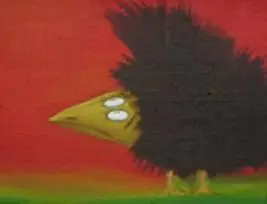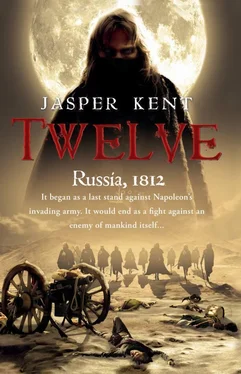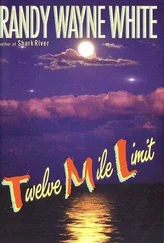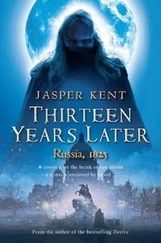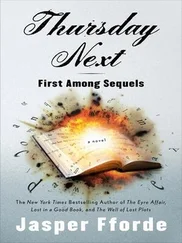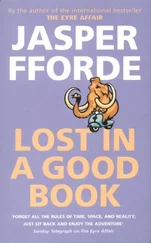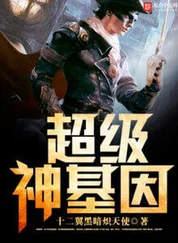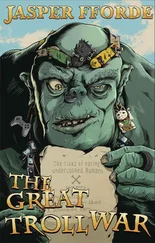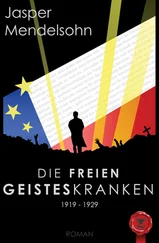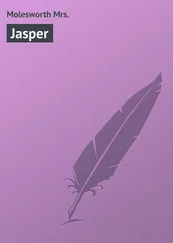I waited for a further minute with my numbed arm plunged deep into the river before I raised it to look into his face. He was gone. A clump of trailing blond hairs was left curled around in my insensible fingers, but of the rest of him there was no sign. His body had been ripped from my numb, frozen hand by the torrent of the river. I looked out downstream, but it was an impossible task to distinguish one lifeless, floating corpse from another. Amongst them, a few swimmers even now made it to the safety of the western shore, but I did not see Iuda amongst those either.
I pulled myself back in, underneath the bridge, my knees hunched up against my chest as I listened, troll-like, to the tramp, tramp, tramp of feet above my head. I began to shiver. The layers of clothing that I wore were all wet through. If I were to leave my hand at rest for too long against some piece of the bridge's structure, it might freeze there. I crawled back along under the bridge to the eastern bank of the river. Thousands still remained to cross, but it was now unlikely that many more would. The Russian troops under Kutuzov and Wittgenstein were closing in.
I headed south along the riverbank, quickly discarding my French greatcoat. The choice was between death from the cold or from a Russian bullet. I chose not on the basis of preference but of likelihood, and it was a close-run thing. As I continued downriver, those few Russian patrols I encountered were convinced by a few words from me. The even fewer French I met were just as easily convinced when they heard their own language.
Before long, I came to Borisov, the town abandoned by Bonaparte but a few days before. Now Bonaparte was heading back west. How much of his army made it with him was open to question, but he himself would surely get back to Paris. I had no further desire to chase him, nor to chase any other Frenchman. And if Iuda were somehow still alive, I did not have the desire to pursue him, or even find out for sure if he was dead or not. He was out of Russia, or very soon would be – whether swept south, downriver to the Black Sea, or swept west with the Grande Armée to Poland and beyond. He was no longer my problem. My problems were those that he had left with me.
Though it was still dark when I reached Borisov, I was lucky enough to be able to find a horse, left forgotten as the French rushed north. I mounted it and headed out of the town.
Bonaparte would struggle on for a few more years and would even, it would transpire, rise as a brief phoenix before his ultimate finale, but here in Russia his defeat had begun. It was not a defeat that I had taken any part in. I had fought Bonaparte at Austerlitz and we had lost. I had fought him at Smolensk, and we had lost. After Borodino I had found another battle to fight. If my grandchildren one day were to ask me how I helped in the downfall of Napoleon, I would be unable to tell them the truth. I could tell them of Maksim and of Vadim and Dmitry and of how we had fought together in unorthodox ways on and off for seven years, but I could never tell them how it had ended. I could never tell them how Dmitry had frozen to death and how he had been lucky compared to Vadim and how even Vadim had been lucky compared to Maksim. For although both Vadim and Maksim had died a similar death, Maks had the added weight of knowing that he had been sent to it by those he thought to be his friends.
The doubt about Domnikiia which Iuda had so guilefully insinuated into me was, I now understood, easy to cope with. It was Maks who had suggested the solution to me. It was a matter of faith. Faith, Maks had said, allows us to feel certain about things that we can never know for sure. I could never discover whether it had been Domnikiia or Margarita with Iuda – that was knowledge that could never be known – but it was clear what I wanted the truth to be. All I had to do was have faith in my chosen view of reality. It would not be easy, certainly not for a man like me, to maintain such faith, but the fact that it meant I could be with Domnikiia would make the effort worthwhile. Every day on which my faith was rewarded would in its turn strengthen that faith – and strengthen my need for that faith. I would not, however, be seeing Domnikiia quite every day.
The town of Borisov holds an interesting geographical position in Russia. It stands on one corner of an equilateral triangle, of which the other two vertices are Moscow and Petersburg. From here it was as far to Petersburg as it was to Moscow, and it was as far again from one to the other.
I could weigh myself down now with the choice of which one to go to, and I would not even attempt to fool myself that it was a choice between two cities – it was a choice between Domnikiia and Marfa. It did not matter which road I chose now – Moscow or Petersburg – I would still be able to travel at will between the two. I knew that I could never give up Domnikiia, simply because I did not want to. I knew that I would never abandon Marfa, not only because I would never abandon my son, but because I knew that my love for her was always inside me, waiting to be rekindled whenever I chose to let it. I spurred my new horse and headed off under a red sky, just beginning to be lit in the east.
Birds began to awaken to the new dawn and, to the sound of their song, the nightmare began to fade. My country had faced five hundred thousand invaders. I had faced just twelve. We had both won. We would both recover. But, unlike Russia herself, when I was to look back on the events of the autumn and winter of the year 1812, I would not feel the blood coursing in my veins, my heart swelling in my bosom and my lip quivering at the recollection of honours past. Oh, I would shed a tear for my fallen friends. But, unlike my country, I would feel no pride.
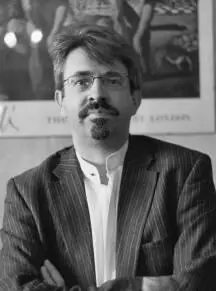
Born in 1968, Jasper Kent has a degree in Natural Sciences from Trinity Hall, Cambridge, and works as a freelance software consultant. He has also written several musicals. He lives in Brighton.
***
